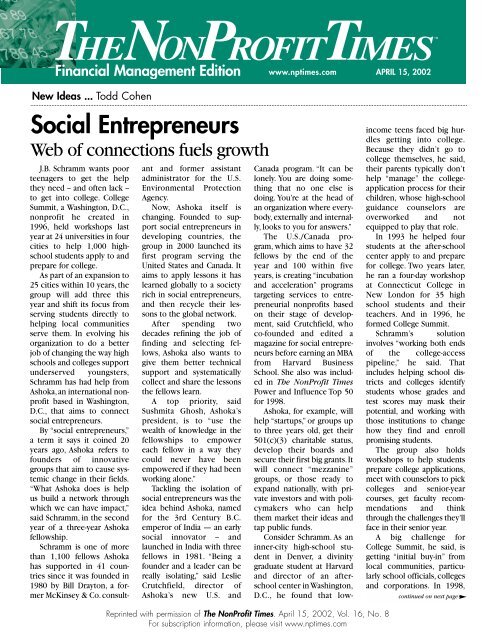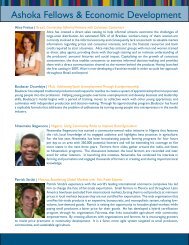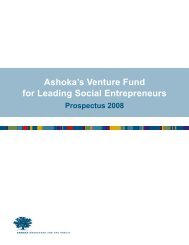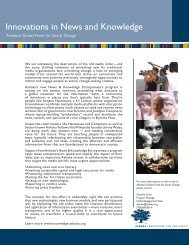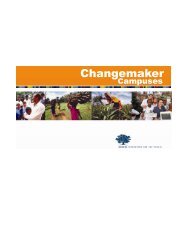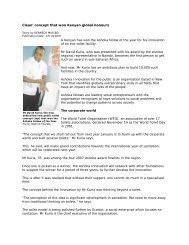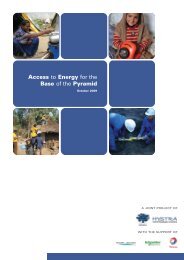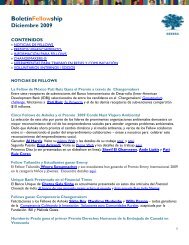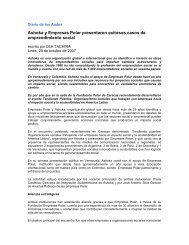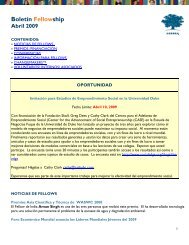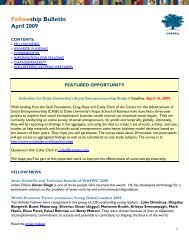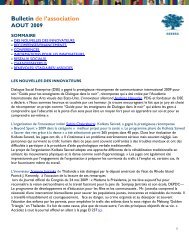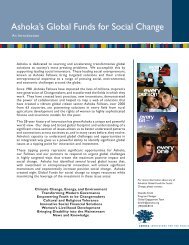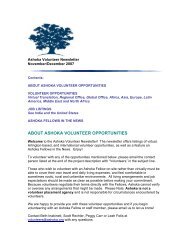Social Entrepreneurs - Ashoka
Social Entrepreneurs - Ashoka
Social Entrepreneurs - Ashoka
You also want an ePaper? Increase the reach of your titles
YUMPU automatically turns print PDFs into web optimized ePapers that Google loves.
New Ideas ... Todd Cohen<br />
<strong>Social</strong> <strong>Entrepreneurs</strong><br />
Web of connections fuels growth<br />
J.B. Schramm wants poor<br />
teenagers to get the help<br />
they need -- and often lack -to<br />
get into college. College<br />
Summit, a Washington, D.C.,<br />
nonprofit he created in<br />
1996, held workshops last<br />
year at 24 universities in four<br />
cities to help 1,000 highschool<br />
students apply to and<br />
prepare for college.<br />
As part of an expansion to<br />
25 cities within 10 years, the<br />
group will add three this<br />
year and shift its focus from<br />
serving students directly to<br />
helping local communities<br />
serve them. In evolving his<br />
organization to do a better<br />
job of changing the way high<br />
schools and colleges support<br />
underserved youngsters,<br />
Schramm has had help from<br />
<strong>Ashoka</strong>,an international nonprofit<br />
based in Washington,<br />
D.C., that aims to connect<br />
social entrepreneurs.<br />
By “social entrepreneurs,”<br />
a term it says it coined 20<br />
years ago, <strong>Ashoka</strong> refers to<br />
founders of innovative<br />
groups that aim to cause systemic<br />
change in their fields.<br />
“What <strong>Ashoka</strong> does is help<br />
us build a network through<br />
which we can have impact,”<br />
said Schramm, in the second<br />
year of a three-year <strong>Ashoka</strong><br />
fellowship.<br />
Schramm is one of more<br />
than 1,100 fellows <strong>Ashoka</strong><br />
has supported in 41 countries<br />
since it was founded in<br />
1980 by Bill Drayton, a former<br />
McKinsey & Co.consult-<br />
ant and former assistant<br />
administrator for the U.S.<br />
Environmental Protection<br />
Agency.<br />
Now, <strong>Ashoka</strong> itself is<br />
changing. Founded to support<br />
social entrepreneurs in<br />
developing countries, the<br />
group in 2000 launched its<br />
first program serving the<br />
United States and Canada. It<br />
aims to apply lessons it has<br />
learned globally to a society<br />
rich in social entrepreneurs,<br />
and then recycle their lessons<br />
to the global network.<br />
After spending two<br />
decades refining the job of<br />
finding and selecting fellows,<br />
<strong>Ashoka</strong> also wants to<br />
give them better technical<br />
support and systematically<br />
collect and share the lessons<br />
the fellows learn.<br />
A top priority, said<br />
Sushmita Ghosh, <strong>Ashoka</strong>’s<br />
president, is to “use the<br />
wealth of knowledge in the<br />
fellowships to empower<br />
each fellow in a way they<br />
could never have been<br />
empowered if they had been<br />
working alone.”<br />
Tackling the isolation of<br />
social entrepreneurs was the<br />
idea behind <strong>Ashoka</strong>, named<br />
for the 3rd Century B.C.<br />
emperor of India — an early<br />
social innovator -- and<br />
launched in India with three<br />
fellows in 1981. “Being a<br />
founder and a leader can be<br />
really isolating,” said Leslie<br />
Crutchfield, director of<br />
<strong>Ashoka</strong>’s new U.S. and<br />
www.nptimes.com<br />
Canada program. “It can be<br />
lonely. You are doing something<br />
that no one else is<br />
doing. You’re at the head of<br />
an organization where everybody,<br />
externally and internally,<br />
looks to you for answers.”<br />
The U.S./Canada program,<br />
which aims to have 32<br />
fellows by the end of the<br />
year and 100 within five<br />
years, is creating “incubation<br />
and acceleration” programs<br />
targeting services to entrepreneurial<br />
nonprofits based<br />
on their stage of development,<br />
said Crutchfield, who<br />
co-founded and edited a<br />
magazine for social entrepreneurs<br />
before earning an MBA<br />
from Harvard Business<br />
School. She also was included<br />
in The NonProfit Times<br />
Power and Influence Top 50<br />
for 1998.<br />
<strong>Ashoka</strong>, for example, will<br />
help “startups,” or groups up<br />
to three years old, get their<br />
501(c)(3) charitable status,<br />
develop their boards and<br />
secure their first big grants.It<br />
will connect “mezzanine”<br />
groups, or those ready to<br />
expand nationally, with private<br />
investors and with policymakers<br />
who can help<br />
them market their ideas and<br />
tap public funds.<br />
Consider Schramm. As an<br />
inner-city high-school student<br />
in Denver, a divinity<br />
graduate student at Harvard<br />
and director of an afterschool<br />
center in Washington,<br />
D.C., he found that low-<br />
Reprinted with permission of The NonProfit Times. April 15, 2002, Vol. 16, No. 8<br />
For subscription information, please visit www.nptimes.com<br />
APRIL 15, 2002<br />
income teens faced big hurdles<br />
getting into college.<br />
Because they didn’t go to<br />
college themselves, he said,<br />
their parents typically don’t<br />
help “manage” the collegeapplication<br />
process for their<br />
children, whose high-school<br />
guidance counselors are<br />
overworked and not<br />
equipped to play that role.<br />
In 1993 he helped four<br />
students at the after-school<br />
center apply to and prepare<br />
for college. Two years later,<br />
he ran a four-day workshop<br />
at Connecticut College in<br />
New London for 35 high<br />
school students and their<br />
teachers. And in 1996, he<br />
formed College Summit.<br />
Schramm’s solution<br />
involves “working both ends<br />
of the college-access<br />
pipeline,” he said. That<br />
includes helping school districts<br />
and colleges identify<br />
students whose grades and<br />
test scores may mask their<br />
potential, and working with<br />
those institutions to change<br />
how they find and enroll<br />
promising students.<br />
The group also holds<br />
workshops to help students<br />
prepare college applications,<br />
meet with counselors to pick<br />
colleges and senior-year<br />
courses, get faculty recommendations<br />
and think<br />
through the challenges they’ll<br />
face in their senior year.<br />
A big challenge for<br />
College Summit, he said, is<br />
getting “initial buy-in” from<br />
local communities, particularly<br />
school officials, colleges<br />
and corporations. In 1998,<br />
continued on next page
New Ideas<br />
continued from previous page<br />
when the group was running<br />
workshops at 10 colleges in<br />
seven states, a McKinsey<br />
consultant donated some<br />
time to assess the operation<br />
and suggested the group<br />
could be more effective by<br />
concentrating its efforts in<br />
fewer states.<br />
So with $500,000 from<br />
the John S. and James L.<br />
Knight Foundation in Miami,<br />
College Summit cut back to<br />
four jurisdictions, Chicago,<br />
Denver, the District of<br />
Columbia and Miami.<br />
Nearly eight of 10 students<br />
that College Summit assists<br />
have enrolled in college,compared<br />
with less than five of<br />
10 low-income high-school<br />
graduates nationally,<br />
Schramm said. And, eight of<br />
10 College Summit grads who<br />
enrolled in a college or university<br />
either still were<br />
enrolled or graduated within<br />
six years, compared with a<br />
college graduation rate of<br />
roughly two in 10 for lowincome<br />
black students, he<br />
said.<br />
As part of its plan to serve<br />
25 communities within a<br />
decade, the group this year<br />
will launch operations in<br />
Dallas, the Central Valley of<br />
California and Charleston,<br />
W.Va. It will begin shifting its<br />
focus to equipping communities<br />
to take on the job of<br />
working more closely with<br />
low-income teens.<br />
In addition to providing<br />
$150,000 over three years,<br />
<strong>Ashoka</strong> has connected<br />
Schramm to people who can<br />
help him better cope with<br />
the change he’s trying to<br />
bring about, both inside his<br />
own organization and in the<br />
field of education,he said.“At<br />
the heart of <strong>Ashoka</strong>’s insight<br />
is the idea that leaders drive<br />
social change, and leaders<br />
have impact through networks,”<br />
he said.<br />
<strong>Ashoka</strong>, for example,<br />
introduced Schramm to<br />
Dallas <strong>Social</strong> Venture<br />
Partners, a new spinoff of<br />
Seattle-based <strong>Social</strong> Venture<br />
Partners that has launched<br />
College Summit in Dallas as<br />
one of its first major initiatives.<strong>Ashoka</strong><br />
also introduced<br />
Schramm to the Jenesis<br />
Group, a Texas foundation<br />
with offices in New York<br />
City that is helping College<br />
Summit develop and fund<br />
the expansion of its operations.<br />
As part of its own shift in<br />
focus, the Center for <strong>Social</strong><br />
<strong>Entrepreneurs</strong>hip that<br />
<strong>Ashoka</strong> developed in partnership<br />
with McKinsey’s<br />
office in Sao Paolo, Brazil, is<br />
launching a business-plan<br />
competition. The competition<br />
will solicit applications<br />
from 80 social entrepreneurs<br />
in Brazil, pairing them with<br />
business school students and<br />
McKinsey consultants to<br />
help develop their business<br />
plans. It will then fund 10<br />
winners, which will get free<br />
McKinsey support in putting<br />
their plans into practice.<br />
<strong>Ashoka</strong> and McKinsey<br />
also have opened an entrepreneurship<br />
center in India,<br />
and plan additional centers<br />
at McKinsey offices in<br />
Germany, Latin America,<br />
Poland and Thailand.<br />
<strong>Ashoka</strong> also is developing<br />
professional alliances in the<br />
United States with management<br />
consultants, law firms<br />
and lobbying firms that can<br />
provide support and connec-<br />
Reprinted with permission of The NonProfit Times. April 15, 2002, Vol. 16, No. 8<br />
For subscription information, please visit www.nptimes.com<br />
tions for its fellows. Those<br />
alliances will serve as a<br />
model that <strong>Ashoka</strong> then will<br />
expand to serve its fellows<br />
overseas.<br />
“The reason we’re pioneering<br />
it in the states is<br />
because the social sector is<br />
so advanced here,” said<br />
Crutchfield.<br />
Ghosh, who previously<br />
helped run <strong>Ashoka</strong>’s operation<br />
in India and founded<br />
and edited Changemakers,<br />
the organization’s print and<br />
online magazine, said that in<br />
addition to delivering products<br />
and services to its fellows,<br />
<strong>Ashoka</strong> aims to help<br />
diversify investment in<br />
social enterprise beyond<br />
government and foundation<br />
assistance by mobilizing citizen<br />
and corporate support.<br />
“Getting society ready to<br />
contribute at a larger level,”<br />
she said, “is what a citizenbased<br />
initiative program<br />
does�”<br />
Todd Cohen is editor<br />
and publisher of<br />
Nonprofitxpress, an online<br />
newspaper at www.npxpress.com.<br />
He can be<br />
reached at tcohen@ajf.org.


